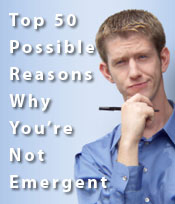 This is the second part of a book review, exploring Phyllis Tickle’s, The Great Emergence. Part 1 is here.
This is the second part of a book review, exploring Phyllis Tickle’s, The Great Emergence. Part 1 is here.
Chapter 4 explores the agent of change in the Great Emergence we’re experiencing: science. She points to Darwin’s theory of evolution and Faraday’s discovery of magnetic fields as the lines of demarcation for peri-Emergence. I would offer that Tickle’s choice of Darwin is obvious but her choice of Faraday is brilliant. Without Faraday’s breakthrough’s in electricity, the industrial revolution and the subsequent knowledge and Internet revolution would likely never have occurred, both of which have been pivotal tipping points to the Great Emergence.
Darwin on on the other hand is well known. His work in biology led to the churches response, ultimately giving us the rise of fundamentalism. Tickle states:
“That which has held hegemony (assumed leadership), finding itself under attack, always must drop back, re-entrench itself, run up its colors in defiance, and demand that the invaders attack its stronghold on its own terms.”
Sound familiar to anyone who has been attacked for being emergent?
This impact of science also extended to Freud and Jung in psychology, shedding light on the collective unconscious, asking what it really means to be human. It was further pushed along by the radio and television, which propelled Joseph Campbell’s work to challenge some of the central themes of fundamentalism.
“A challenge that would have been rejected by believers as clerical heresy had it been delivered from the pulpit was now being listened to and thought about and talked about around water coolers and over backyard fences.”
The radio and eventually television allowed people to process valuable ideas and information in the comfort of their own home, as opposed to the “sacrosanct” space under the watchful eye of smarter people and religious leaders. This served to fuel the collective imagination, freeing people to think and process ideas that were once off limits.
These freedoms eventually led to the cognitive sciences. People began to ask:
“What are we/what am I? Is there even such a thing as the ‘self’? … More to the point, how can ‘I’ be held responsible for anything anywhere anytime?”
This collective questioning then as Tickle states, reasserts “the same central question: Where, now, is authority?” The process of reforming is then under the new authority established over time in the new expressions of religion.
Chapter 5 is the longest and by far my favorite chapter and essentially continues chapter 4. It explores the central tipping points of the last 100 years, each seeming to build on each other. It begins with Einstein’s special theory of relativity on, which then led to Heisenberg’s theory of uncertainty. Heisenberg’s theory suggested that the act of observing something changes that very thing. This called into question any notion of fact because the scientist observing fact is always changing the very thing he is observing. Now apply this principle to the Bible and everyone gets scared.
“Enter the battle of The Book. Enter the warriors, both human and inanimate, who will hack the already wounded body of Sola Scriptura into buriable pieces,” Tickle states.
This theory led Reimarus to ask if the Jesus of Western History is the same Jesus of the Nazareth. This question spurred on the work of Crosson, Borg, and Pagels in the Jesus Seminar.
I find Tickles words fascinating here. She says,
“Literalism based on inerrancy could not survive the blow (though is would die a slow and painful death); and without inerrancy-based literalism, the divine authority of the Scripture was decentralized, subject to caprices of human interpretation, turned into some kind of pick-and-choose bazaar for skillful hagglers. Where now is our authority?“
This question of authority pervades the book. It almost feels like a grand theme invading history. But Tickle offers the first possible insight into this question in Pentacostalism, which relied on the leading of the Holy Spirit. “Here is our authority,” Pentacostalism suggests. This shift even comes at the expense of the authority of Sola Scriptura and pastors.
It was also interesting to hear how the automobile, Marxism, and AA significantly affected the role of the grandmothers as a defining force in the family and the pastor as a guiding force for leadership. I was also really surprised but impressed that Tickle included the drug culture as a force in culture and on our perceptions on what is consciousness.
Tickle also tackles the issues that have given significant blows to the concept of Sola Scriptura. These include slavery, women’s rights, divorce, women’s ordination, and gay rights. She says,
“When it is all resolved-and it most surely will be-the Reformation’s understanding of Scripture as it had been taught by Protestantism for almost five centuries will be dead. That is not to say that Scripture as the base of authority will be dead. Rather it is to say that what the Protestant tradition has taught about the nature of that authority will be either dead or in mortal need of reconfiguration.”
That is a million dollar statement if true. And remember, Tickle is a staunch Calvinist and 65 years old. But it is the following sentences that caught me as just as important, for it is the reaction to this statement that we will likely experience in strong measure. She says,
“And that kind of summation is agonizing for the surrounding culture in general. In particular, it is agonizing for the individual lives that have been built upon it. Such an ending is to be staved off with every means available and resisted with every bit of energy that can be mustered.”
I know people who are going through this and to watch it is sad to watch.
Tickle does agree that there are many concepts she does not or cannot touch that were significant in leading up to the Great Emergence. The ones I believe were deeply significant that she did not touch on include the shift from agrarian culture to industrial culture (an outcome of Faraday’s work). This shift took the father out of the home as a dominant force in the family. Tickle does mention the loss of the mother with the advent of the pill, but misses the first shift that took place some 100 years earlier. I was also surprised she didn’t mention the assassination of the Kennedy’s or MLK as watershed moments in emergence. These three assassinations were reasonably considered some of the defining moments of my parents (and Tickle’s) generation. The third event I would have highlighted was the Vietnam War. This was the first time an large portion of a generation rebelled against their parents for reasons of trust, and in a way that was broadcast in the media. The affects of it were revolutionary to say the least, causing a radical divergence (or emergence) in thinking from one generation to the next.
Section 3 – Where Is It Going?
One of the things I appreciate about Tickle’s approach is that she is humble in her approach to being a prophet. But she does use existing developments to begin reading the “tea leaves” of where the church is going.
Chapter 6 explores the history of moments that gave the reformation its name and asks the same questions about the Great Emergence, suggesting there has yet to be such a catalyzing event such as the Protestatio.
I would only suggest that the events surrounding the Young Leaders Network explored in The New Christians will eventually be considered such a shifting event. Out of this rose important people (McLaren, Kimball, Pagitt, Jones) who could began to wrestle with what was emerging and what it meant to emerge.
Tickle continues with the issue of definitions, exploring what the potential distinctions are and wrestling with the generous orthodoxy and overlapping nature of these distinctions. Most, I would imagine find thesmelves in more than one box. She even says,
“And so it goes–semi-permeable lines of division that mean to suggest places on a spectrum rather than absolute boundaries.”
I kept thinking of McLaren’s Generous Orthodoxy and the mashup of music that occurred over the last twenty years. Good things came out of learning from each other and expressing it in creative ways. But the cost of this is also the purity that is derived from the original form and tradition. And some are just simply not going to like or agree with this.
Tickle clarifies the distinctions of orthodoxy and especially orthopraxy, calling it, “(An) emphasis on (correct) religious action.” I was struck by the notion of the tediousness she placed on orthopraxy. It kind of struck me as odd. But I also get that. Orthopraxy, in a religious sense can feel tedious. I think this is why I prefer Rollin’s understanding of “believing in the right way.” The emphasis isn’t on the specific action, which can become an unnecessary burden in itself, but instead on the heart and motive of the action. To me, love and trust are the central motives, not just actions of the Gospel, and thus are not specific religious constructs in that sense.
For Tickle, and I would share this, the Great Emergence is blurring the lines between the traditional categories we place ourselves in, which also find their identity in specific and historical, orthodox opinions and practices.
I also appreciated how Tickle brought out the shift from rural to urban living as playing a large part in this blurring of the lines of religious conversation. The move from isolation in the outer areas to the city where people live on top of each other, shifted the conversation and took religion to the watercooler. She explores how this conversation created a center of communication and thought.
“American religion had never had a center before, primarily because it was basically Protestant in its Christianity; and Protestantism, with its hallmark characteristic of divisiveness, has never had a center. Now one was emerging, but that was emerging was no longer Protestant.”
Tickle then explored what came out of these conversations: the emerging expressions of people gathered together in conversation. She says,
“All however share on shining characteristic: they are incarnational. Not only is Jesus of Nazareth incarnate God, but Christian worship must incarnate as well.”
I deeply appreciated this and have stated so here. She continues,
“There is enormous energy in centripetal force, especially as it gathers more and more of its own kind into itself. Centripetal force, though, is usually envision by us as running downward, like the water in a bathtub drain. The gathering force of the new Christianity did the opposite. it ran upward and poured itself out, like some bursting geyser, in expanding waves of influence and nourishment. Where once the corners had met, now there was a swirling center, its centripetal force racing from quadrant to quadrant in ever-widening circles, picking up ideas and people from each, sweeping them into the center, mixing them there, and then spewing them forth into a new way of being Christian, into a new way of being church.”
This one paragraph so aptly states the nature of the emerging movement. The backlash to this was that the purists (Tickle’s word, and for lack of a better term) of each camp would resist all change. But Tickle suggests that this reaction is actually good for everyone involved acting as sort of a ballast so the “boat” doesn’t tip over. She suggest change is good but only so much and over time.
I liked this idea and agree with it. The conversations I have had with my friends who argue vehemently against the emerging church have been good for me. They have allowed, even required, me to question my own thoughts and intentions and come to some great conclusions.
Tickle also explores the new expressions of the traditional movements. These include traditionalists, re-traditionalists, progressives, and hyphenateds. Each serves a valuable purpose in the four original quadrants. I particularly liked the metaphors she used to describe each expression, which I leave to those who read the book.
Chapter 7 reiterates the basis for all transformation is the question, “Where is the authority?” It explores the new abstracts that emerge in the Great Emergence: orthonomy and theonomy. These terms describe the tension between the left and right camps to answer the ultimate question.
Where we are going is thus answered in the expression of where the authority lies. Will it include Sola Scriptura in modified form? Will in be subject to the influences of community? Tickle also offers the idea of crowd sourcing to explain why conversation is so important. But within this idea lies a brilliant analysis. What is appears she is saying is that the ultimate question will be answered not by one source but by a conglomeration of sources (Scripture, community, Holy Spirit, circumstance, priesthood), all designed to keep authority from being aggregated and controlled by a small group of people. This will not sit well with some people.
What is interesting is that Tickle seems to suggest that the Quakers had it right all along, willing to be open to multiple forms of authority and community context all along. This fascinated me. She also looked briefly into the history of Chuck Smith’s Calvary Chapel (which I attended in the 80’s) and Wimber’s Vineyard fellowship, highlighting the tensions with emergence in the former and the embracing of emergence in the latter. She credits Wimber with the rally cry of “authenticity”.
Tickle does touch on center sets and bounded sets, narrative theology and Constantine’s impact on the Hellenization of Christianity, and our revisiting of key elements of doctrine and theology, but her mentions are only brief if well thought out. She concludes with a statement that I found fascinating. She said,
“If in pursuing this line of exegesis, the Great Emergence really does what most of its observers think it will, it will rewrite Christian theology-and thereby North American culture-into something far more Jewish, more paradoxical, more narrative, and more mystical that anything the Church has had for the last seventeen or eighteen hundred years.”
How you feel about this statement will likely coincide with how you feel about the Great Emergence itself.
Conclusion: I cannot overstate the importance of this book on the church. It’s a simple, elegant book that takes about four hours to read, but will give those looking for a clear understanding of the history and complexity behind emergence a big piece of the puzzle.
You can also continue the conversation with Tickle and many others at The Great Emergence conference.
Well done Phyllis.
Read Full Post »

 This is the second part of a book review, exploring
This is the second part of a book review, exploring 









 This is Kara Powell. You probably don’t know Kara but you should. She’s
This is Kara Powell. You probably don’t know Kara but you should. She’s 









